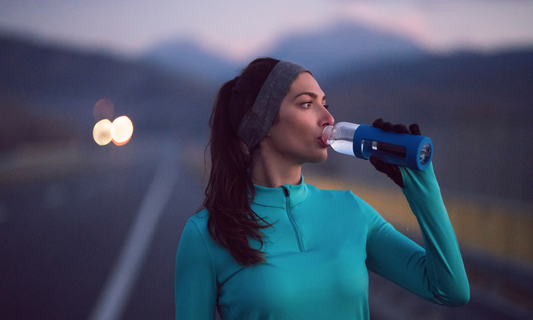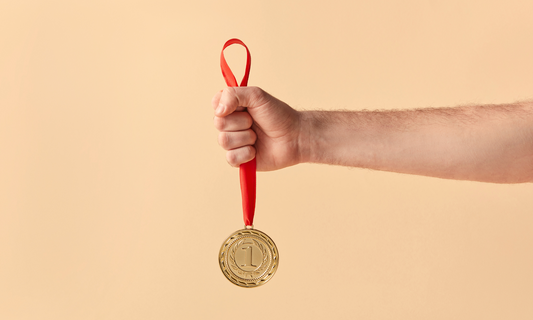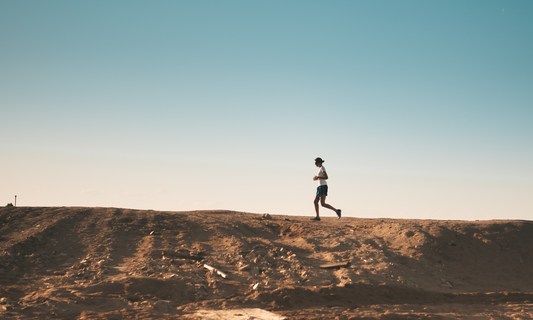What is the best hydration strategy for a marathon?

As you approach a marathon , it's important to pay close attention to your diet and nutrition. Hydration is a key element to ensure optimal performance and avoid risks such as dehydration. Staying adequately hydrated throughout your race is essential to maintain a good level of hydration and support your prolonged effort . Be careful, however, not to drink too much! In this article, we will give you hydration strategies for marathon runners, taking into account the specific needs of each person during such a long race!
Understanding Hydration Needs During a Marathon
What is the role of hydration for the marathon runner?

Water plays a key role in maintaining bodily functions, including regulating temperature, lubricating joints, transporting nutrients, and eliminating metabolic waste . During a race like a marathon , the body loses a significant amount of water through perspiration. Depending on the profile, athletes can lose 1L to 1.5L of water per hour of exercise through sweat and sometimes up to 3.7L/hour in extreme conditions! Uncompensated water loss can lead to a decrease in physical and cognitive performance. Note that 1% water loss as a percentage of body weight = 10% less performance! A well-designed and personalized hydration strategy is therefore essential to prevent the risk of dehydration, maintain high performance, and prevent problems that can be encountered during a race such as dehydration, heatstroke, and cramps.
Factors influencing water needs during a marathon
Indeed, different factors must be taken into account during a marathon. The runner must in particular pay attention to the duration of his effort because the needs will not be the same for a marathon runner who runs in 2 hours and another who finishes in 5 hours. Climatic conditions such as hot or humid weather and the capacity of each runner to retain water in his body , must also be taken into account. For example, during a race in high temperatures of more than 25°C, the needs will be increased compared to an event which passes in winter at 5°C. Water losses through perspiration will be significantly higher during the event in high heat, therefore requiring a higher intake of liquid to maintain good hydration. In addition, the intensity of the effort and the distance covered in kilometers also influence the need in milliliters of water per hour of running. Water needs vary from one runner to another depending also on their weight, their metabolism and their level of training .

It also seems necessary to understand that hydration is not limited to water alone. Electrolytes , such as sodium, potassium, and magnesium, but also sugars such as dextrose, play an important role in maintaining the body's water balance.
These electrolytes (especially sodium) are lost in large quantities through sweat during a marathon. It is therefore necessary to replace these water losses to avoid muscle cramps, fatigue, and other problems related to electrolyte imbalance .
Risks of inadequate hydration
Dehydration
As you might expect, dehydration is a major risk during a marathon, especially if the runner does not drink enough water to compensate for the fluid and electrolyte losses due to perspiration. Various symptoms can be signs of dehydration, such as fatigue, decreased energy, lack of concentration and, in more severe cases, muscle problems, dizziness and fainting . Dehydration causes an increase in body temperature and can therefore lead to heat stroke.
To avoid all these problems, it's essential to regularly drink small sips of water throughout the race and before you feel thirsty. Indeed, the sensation of thirst is not always a reliable indicator of the body's hydration status, especially during intense physical exertion. That's why it's better to drink small sips regularly than to down your entire water bottle in one gulp!
Overhydration

Yes, hydration is essential. However, drinking too much water can also be dangerous for your health! Indeed, excessive water consumption, without electrolyte intake, can dilute sodium in the blood, leading to hyponatremia . This can cause various symptoms such as nausea, vomiting , headaches, confusion, seizures and in some severe cases, coma or even death (FYI, a marathon runner in Boston died in 2002 from hyponatremia).
Therefore, it is important to maintain a good balance by choosing suitable drinks such as sports drinks that contain electrolytes , helping to replace minerals lost through sweat.
What are the different hydration strategies for a marathon?
It's important to know that you need to have tested hydration strategies before your goal! During your long runs (which are necessary for marathon preparation), try to consume the same products and the same volume of water based on what you plan to consume during your marathon! This will improve your digestive system's ability to eat and drink during exercise.
Before the marathon
Even before the big day, it is advisable to focus on your hydration . In fact, staying well hydrated in the days leading up to the race will help your body be ready! Runners are advised to drink between 5 and 7 ml of fluid per kilogram of body weight per hour, 2 to 4 hours before the activity, to ensure adequate fluid reserves . Runners should also avoid drinking large amounts of water just before the start, as this can lead to frequent urination or even, in more serious cases, digestive problems during the race, which can affect the athletes ' performance.
 During the marathon
During the marathon
During the marathon, it is recommended to hydrate with water or sports drinks at regular intervals , every 10 to 15 minutes. Drinking a few sips of liquid regularly helps maintain constant hydration without overloading the stomach. Runners should also adapt their hydration according to the temperature and their sweating level . The hotter it is, the more beneficial it will be to hydrate in greater quantities.
Hydration packs and belts can be useful accessories to ensure you're drinking enough without having to stop at refreshment points too often. These accessories also help you monitor the amount of water you consume and avoid overhydration .
After the marathon
After the race, rehydration is essential to restore the body's water balance and promote rapid recovery . It is recommended to drink approximately 1.5 times the amount of fluid lost during exercise, which means that a person who has lost 2 kg should consume 3 liters of water post-exercise (2x1.5). Products containing carbohydrates and sodium are particularly effective in accelerating rehydration and muscle recovery . Concretely, it is crucial to continue to hydrate regularly in the hours that follow, to compensate for fluid loss and prevent dehydration , while foods rich in water, such as fruits and vegetables, can also contribute to fluid intake , while providing essential nutrients.











